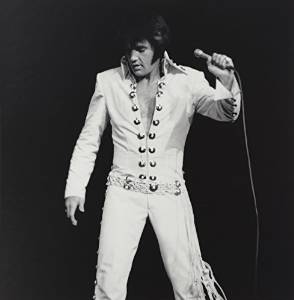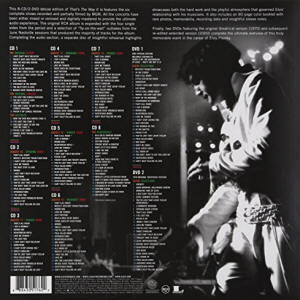(C) Sony Music Entertainment /RCA Legacy
The first disc presents the tracks of the original album as well as the mono mixes of the studio recordings, that were released on singles. Besides that, there are some studio outtakes.
I Just Can't Help Believin' (live)
The album starts with a live recording from August 11, 1970 (dinner show). "I Just Can't Help Believin'" was written by Cynthia Weil and Barry Mann, who was also the first to record it in 1968. I like the ballad very much, even though Elvis messes up the lyrics and obviously wants to sing something else than Charlie Hodge, who did the harmony vocal. In Europe RCA released "I Just Can't Help Believin'" on a single, which became a top 10 hit in Great Britain as well as the Netherlands and sold 600,000 units.
Twenty Days And Twenty NightsHere we have another ballad, this time the narrator has left his wife and now realizes his mistake. Elvis performs the song with much emotion and in an absolute believable way. "Twenty Days And Twenty Nights" was written by Ben Weisman and Clive Westlake (whose daughter Julia later became a tv host in Germany) and recorded by Elvis on June 6, 1970. The 9th attempt was approved for release and enhanced with harmony vocals (July 22nd) and strings/horns (July 30th). Besides that the recording was shortened of half a minute.
How The Web Was WovenThis song was released in 1969 by Jackie Lomax, the writers are Dave Most and Clive Westlake. The singer is caught in a web, woven around his heart. In other words: He's in love. Elvis' voice sounds just great here and the song itself is a very good one, too. The king taped it on June 5, 1970 within three takes. His producer Felton Jarvis later added harmony vocals (June 22nd), horns (July 20th) and strings (July 22nd).
Patch It Up (live)The rocker had been released before on the b-side of "You Don't Have To Say You Love Me", but the album features a live recording. To me the performance from August 12, 1970 (dinner show) is much better than the one taped at RCA Studio B in Nashville/Tennessee. The song is taken at a faster pace and performed with much more drive and energy. Especially the drumming is excellent. "Patch It Up" was written by Eddy Rabbit and Rory Bourke.
Mary In The MorningWith this ballad the singer worships the beauty of his beloved Mary. The melody is great and Elvis sings very well, but to me the song is somewhat too long. A minute less wouldn't have hurt. "Mary In The Morning" was written by Johnny Cymbal and Michael Rashkow and recorded on June 5, 1970. Take 5 became the groundwork of the master. On July 20th strings and horns were added, on October 1st harmony vocals followed.
You Don't Have To Say You Love MeIn 1966 Dusty Springfiled scored a top 5 hit with this song, which later was covered countless times. The original is called "Io Che Non Vivo (Senza Te)" and was written by Vito Pallavicini, Jody Miller and Pono Donaggio. The latter one was the first to record it and enjoyed a number 1 on the Italian charts with the song. Elvis wasn't as successful, his cover version stagnated at number 11 on the "Hot 100". RCA Victor later also released the track on the boxed set "The Other Sides - Worldwide Gold Award Hits Volume 2" (1971). The king recorded "You Don't Have To Say You Love Me" on June 6, 1970 and needed just three takes to get it right. On July 30th Felton Jarvis added strings and horns.
You've Lost That Lovin' Feeling (live)This performance is one of the highlights of this album. Elvis doesn't just sing the song, he literally lives it. Two years later another version was released on "Elvis As Recorded At Madison Square Garden", but it doesn't even come close to this one. I'd say, that the ultimate performance of "You've Lost That Lovin' Feeling" was taped on Augst 12, 1970 (midnight show). When the king chose to record the song, it wasn't new or unknown. The Righteous Brothers had scored a huge hit with it in the 1960s and "You've Lost That Lovin' Feeling" became a signiture song for them. By the way, it was written by Cynthia Weil, Barry Mann and Phil Spector.
I've Lost You (live)"I've Lost You" is in the same vein as "You've Lost That Lovin' Feeling". Once again the love is gone and the partners just function in their roles as spouses and parents, but have no romantic feelings for each other anymore. The song had been released by Elvis on a single in June, but it had been a studio recording while this album offeres a live version. Just like with "Patch It Up", I prefer the concert performance (taped during the dinner show on August 11, 1970). It's played a tad faster and has a better flow. The first release of "I've Lost You" had been by Ian Matthews & Southern Comfort, the writers are Ken Howard and Alan Blaikeley.
Just PretendElvis recorded "Just Pretend" on June 6, 1970, the post production was done on June 9th (additional instruments), June 22nd (harmony vocals) and June 30th (strings and horns). The king needed three takes to nail the track by Dough Flett and Guy Fletcher. It's a great song and a stunning performance.
Stranger In The CrowdIn contrast to the previous songs this one describs the beginning of a love. The popsong with a touch of latin was written by Winfield Scott and recorded on June 5, 1970. Elvis selected the 9th attempt for release and had it enhanced with harmony vocals (June 22nd) and strings as well as horns (July 20th). Besides that the performance was shortened a bit.
The Next Step Is LoveThe composers are Paul Evans and Paul Parnes, the king taped it on June 7, 1970 within 11 takes. Felton Jarvis later added further instruments (June 9th), harmony vocals (June 22nd) as well as strings and horns (June 30th). Obviously the arranger of the horns had listened very closely to The Beatles' "Penny Lane". The popsong in easy listening style describes the beginning of a love and was released in July 1970 on the b-side of "I've Lost You". Later RCA Victor also issued the track on the boxed set "The Other Sides - Worldwide Gold Award Hits Volume 2".
Bridge Over Troubled WaterWhile Paul Simon had the homage to his wife (after she had discovered her first gray hair, Simon jokingly called her "silver girl") performed by Art Garfunkel in a quiet and fragile style, Elvis turned the song into a mini-opera with choir, orchestra and his own vocal powers. He would perform it more or less regularly in his concerts, right up to the final one on June 26, 1977. This recording also features applause, but it was simply edited at the end of a studio recording. It was made on June 5, 1970, the 9th attempt was selected for release. On June 9th further instruments were added, backup vocals followed on June 22nd. On June 23rd Elvis recorded harmony vocals and several vocal repairs. Strings and horns were added on June 30th. The production was finalized on October 1st with the addition of further backup vocals and the applause. The result of all this sounds nothing but stunning.
I've Lost You (bonus: single version in mono)The ballad was first released in 1969 by Matthews & Southern Comfort. The writers are Ken Howard and Alan Blaikly. Elvis recorded his version on June 4, 1970 and selected the 7th take for release. On June 9th Felton Jarvis taped additional instruments, on June 22nd he added harmony voices and on June 30th the recording was enhanced with strings and horns. The result was shortened of half a minute. The singer describes a slowly cooling relationship, which somewhat mirrored Elvis' private life at the time.
The Next Step Is Love (bonus: single version in mono)This is the same recording, that we got to hear on the album. Albeit, this time in mono.
You Don't Have To Say You Love Me (bonus: single version in mono)The same applies here.
Patch It Up (bonus: single version in mono)This one is more interesting, because just like in the case of "I've Lost You" the album features a live recording, while the single offeres the studio version. Elvis taped the track on June 8, 1970 within nine takes. Finally he selected his 8th attempt for release. The post-production was done on June 22nd (harmony vocals), July 20th (brass) and July 22nd (organ). Besides that the recording was shortened of half a minute. By the way: "Patch It Up" was written by Eddy Rabbit and Rory Bourke.
How The Web Was Woven (bonus: take 1)Elvis and his band rehearse the finale, afterwards the intro is discussed. Compared to the master the first attempt is taken at a slower pace and the king's phrasing differs a bit. In general it all works very well for a first try.
I've Lost You (bonus: take 1)The tempo is discussed, in the background we can hear some of the musicians rehearsing their parts. Of course the first take is not perfect, but once again it works quite well.
You Don't Have To Say You Love Me (bonus: takes 1 & 2)After a false start, which is counted as take 1, the musicians practice a bit. Take number two sounds a tad reluctant and during the finale Elvis' voice cracks. Nevertheless it's a more than satisfactory performance, considering that it's the first try.
Patch It Up (bonus: take 1)While the band rehearses Felton Jarvis announces "We're rolling". At the time music was recorded on magnetic tapes and the expression means, that the tapes are turning and the recording has been started. It's the first take, so not everything is perfect yet. But it's a powerful performance and it's fun to listen to it.
Bridge Over Troubled Water (bonus: part of take 2 & take 1)To create the impression of a rehearsal, the producers pasted the ending of take 2 in front of take 1. The second attempt is canceled in mid-song and Elvis says, that the sound of the piano reminds him of "Lawdy Miss Clawdy". Then the actual first take follows. It's quite obvious, that the king and his crew had rehearsed the song before they started to record it, because the arrangement has been worked out and everyone seems to know exactly what to do.

